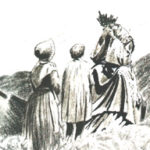The Feast of Our Lady of the Seven Sorrows arose out of Christian piety, and in particular the association of the Virgin Mary with the passion of her Son. From the XIth century onwards, the suffering of the Blessed Virgin has been the object of private devotion. It was celebrated with great solemnity from the XVIIth century, and it was established as a feast in the Church calendar, for September 15, by Saint Pius X in 1912.
In the suffering of Mary, the Church highlights the courageous love which enabled her to take on such an intimate role in the work of our redemption. She is truly the one who, like Judith in the face of the distress of her people, spared nothing in order to save us from ruin. In offering her Son for us, she became our mother and we became her children.

On September 19, 1846, at La Salette in France, Mélanie (14 years old) and Maximin (10 years old) were guarding the flocks of their masters in the mountains. A dazzling light appeared to them and before their eyes they saw a beautiful lady sitting with her head in her hands. This beautiful lady stood up, and with tears running down her face she looked at them, and gave them a message in three parts:
1) The first part is a warning to all Christian people against their blasphemies and their neglect of the commandments of God and the Church. Here is the text of Mary’s Message at La Salette:
“Come my children, do not be afraid, I am here to tell you important news.
If my people will not submit, I will be forced to let go of the arm of my Son. It is so strong and so heavy that I cannot maintain it anymore. All this the time I suffer for you! If I want my Son not to abandon you, I am charged to pray to him incessantly. But you, you do not care! No matter how much you pray, how much you do, you will never be able to reward the trouble I have taken for you.
I gave you six days to work, I reserved the seventh and you do not want to give it to me. This is what presses on the arm of my Son.
And also, those who lead the carts cannot swear without using the name of my Son. These are the two things that weigh heavily on the arm of my Son.
If the harvest is spoiled, it is only because of you. I tried to make you see last year with the potatoes, but you have not taken any notice. On the contrary, when you found the spoiled potatoes, you swore, you blasphemed against the name of my Son. The spoiled harvest will continue, and this year, for Christmas, there will be more. […]
If the people convert, the stones and rocks will become heaps of wheat and the potatoes will be seeded by the land.
Do you pray well, my children?
Not much, ma’am.
Ah! My children, it must be done. Every evening and morning, would you say a “Our Father” and a “Hail Mary…”. And when you can pray better, say more.
In the summer, only a few elderly women go to Mass. The others work on Sundays all through the summer, and in winter, when they do not know what to do, they go to Mass only to make fun of religion.
During Lent, they go to the butchers, like dogs. [….]
Well, my children, you will pass on this message to all my people!
Come, my children, pass it on well to all my people!”
2) The second part includes the “secrets” addressed separately to Melanie then to Maximin that they would only be able to divulge later.
3) The third part consists of a Rule of Religious Life, which Melanie agreed to dictate.
Pius IX having the information in hand, officially proclaimed the facts. Leo XIII in his turn confirmed them.

